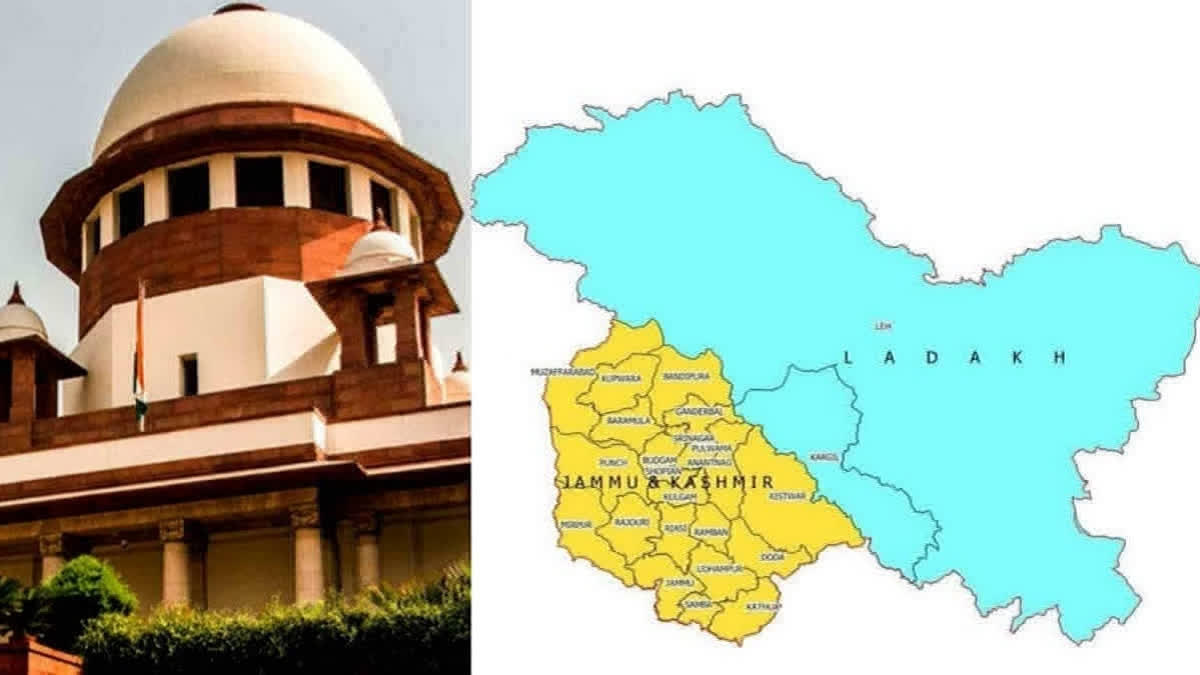New Delhi:In the ongoing hearing of petitions challenging the abrogation of Article 370, the Supreme Court Monday asked the petitioners whether it is their case that there is no solution to Kashmir within the Constitution and that the solution has to be political, outside the Constitution.
The apex court also asked them whether Article 370 was beyond the basic structure doctrine of the Indian Constitution. A five-judge constitution bench headed by Chief Justice of India D Y Chandrachud and comprising justices S K Kaul, Sanjiv Khanna, B R Gavai, and Surya Kant, is hearing a batch of pleas challenging the abrogation of Article 370, which bestowed special status on the erstwhile state of Jammu and Kashmir.
"Ultimately it will boil down to this that there is in our Constitution if we accept your submission, a provision to which even the amending power which is available in respect to the rest of the Constitution is unavailable," the Chief Justice queried senior advocate Kapil Sibal representing the petitioners.
Sibal, who was making a rejoinder argument for the petitioners’, said it is unavailable because it is amended, Article 368 (Power of Parliament to amend the Constitution) has amended with a proviso. The Chief Justice said in that sense, a provision of the Constitution which lies even above the basic structure of the constitution? To which Sibal said, "No"
The Chief Justice observed: “Article 370 you can’t amend also and to amend 370 you have to take the route of Article 368 and Article 368 takes you back to Article 371 by the proviso…we are not saying it is, we are testing a proposition, is there a part of the Constitution? The only restriction we have found so far in our jurisprudence on the power of changing or altering the Constitution as a basic feature doctrine”.
The Chief Justice asked Sibal, “We are now going to add one more which is Article 370, is beyond Article 368 and much beyond the basic structure doctrine because you cannot touch Article 370, it assumes a character of permanence…” Sibal replied, “We are testing the proposition in the context of what they have done…”
The Chief Justice asked Sibal the plain consequences of his submissions is first, “once Article 370 clause 3 goes out of operation for all intents and purposes. 370 (1) has a permanent character in the Constitution…you cannot amend Article 370 using Article 368 power because of the restraint imposed by the proviso, which again takes you back to Article 370, therefore even the power to amend Article 370 is within the fold of Article 370 and not Article 368. So, we are carving out a position of a provision of the Constitution which lies even beyond the basic feature doctrine?”
Sibal said lordships should not say that as it has not been tested yet, whether it is higher than the basic feature of the Constitution or not. What is left with 370, there is no residuary power of the state for all intents and purposes, and it is fully integrated. The Chief Justice said, “In other words, according to you there is no solution to Kashmir within the Constitution… Ultimately that is the argument - that the solution has to be political, outside the Constitution….”.
Sibal said it is a problem looking for a solution and your lordships do not have to provide that solution. The Chief Justice said all solutions would have to be within the framework of the Constitution. Sibal said it is within the framework and who says it is not within the framework and isn’t Article 370 a classic form of federalism and there is nothing unconstitutional about it?
During the hearing, the bench observed that the Constitution does not tell what would happen after the J&K Constitution comes into force and there is no express provision. The bench noted that it was always like allow Article 370 to operate and let the process of integration get over and then concurrence and consultation happen but at what time integration is over is not hedged in the Constitution of India, silences in Article 370 left it to the wise act of both the sides of J&K and the Union of India.
Sibal said the Constitution has to be interpreted and not look at what the silences in the Constitution are. The bench further queried Sibal, according to you the dissolution of the legislative assembly in November 2018, is wrong because there was no aid and advice. The bench asked suppose if the dissolution is incorrect, the consequence would be that at the end of 6 months, the legislative assembly had to be restored. A Council of ministers has to be formed.
Sibal contended that you should never dissolve the assembly immediately because then you have to hold elections and the democratic process cannot be stultified. The rejoinder arguments will continue on Tuesday.
Also read: J&K administration revokes suspension of lecturer who appeared before SC in Article 370 case
